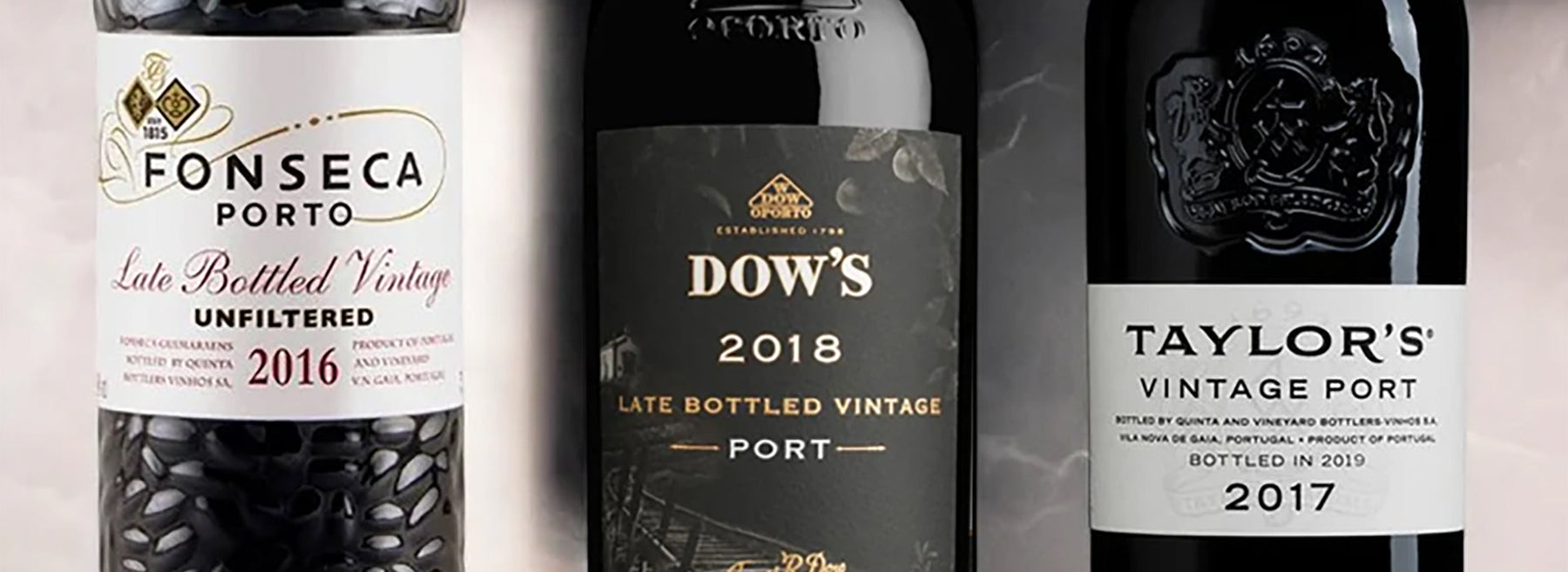
How Is LBV Port Different From Vintage Port? A Complete Guide For Port Wine Lovers
If you're browsing for Port wine and come across both Late Bottled Vintage (LBV) and Vintage Port, you might wonder - what’s the difference? Both are made from a single year’s harvest, and both promise bold, complex flavours. But their paths from vineyard to bottle and how you enjoy them are surprisingly different.
Whether you're choosing a bottle to drink now, or one to age for a future occasion, understanding the key differences can help you pick the perfect Port.
What Is LBV Port?
LBV, or Late Bottled Vintage Port, is made from grapes harvested in a single, declared vintage year. After fermentation, the wine is aged in oak barrels for 4 to 6 years before bottling. This longer time in barrel allows the wine to soften and mature before release - meaning it’s ready to drink as soon as you buy it.
LBV Port was originally created as a more accessible alternative to Vintage Port. It offers some of the same concentrated fruit and depth, but without the need for extended bottle ageing or decanting.
What Is Vintage Port?
Vintage Port is also made from a single year’s harvest but with one major difference: it is bottled after just 2 years of ageing in barrel. That means it goes into the bottle young and powerful, with the intention that it will age in bottle for decades.
Vintage Port is only made in exceptional years when conditions in the Douro Valley are perfect. Producers must apply to declare a vintage, making it a rare and prestigious style of Port.
Explore Our Range Of Vintage Port
Key Differences Between LBV And Vintage Port
Here’s a side-by-side breakdown of what sets them apart:
| Feature | LBV Port | Vintage Port |
|---|---|---|
| Vintage Declaration | Made every year (generally) | Only in outstanding years |
| Ageing Before Bottling | 4–6 years in barrel | 2 years in barrel |
| Bottle Ageing Required | None – ready to drink | Needs long-term cellaring |
| Filtered or Unfiltered | Often filtered, some unfiltered | Always unfiltered |
| Decanting Needed? | Not usually (if filtered) | Yes, always |
| Shelf Life After Opening | 2–3 weeks | 1–2 days |
| Price | More affordable | Premium-priced |
| Best Use | Casual enjoyment, gifts | Special occasions, ageing collectors |
What Does LBV Taste Like Compared to Vintage Port?
While both styles share bold fruit flavours like blackberry, plum and cherry, LBV is generally smoother and more immediately approachable. Expect a full-bodied profile with hints of spice, dark chocolate and soft tannins.
Vintage Port, on the other hand, is more intense, structured and tannic in its youth. Over years or decades in bottle, it develops layers of dried fruit, fig, tobacco, and earthiness that make it highly sought after by collectors.
Do You Need to Decant LBV Or Vintage Port?
- Most filtered LBV Ports don’t require decanting. They’re designed for convenience - pop the cork and enjoy.
- However, unfiltered LBVs (often labelled “Traditional LBV”) can throw a sediment and should be decanted. Always check the label.
- Vintage Port always requires decanting. Since it is bottled unfiltered and meant to age, sediment is a natural part of the wine and needs to be separated before serving.
How Long Can You Keep Each Style?
- LBV Port: Once opened, lasts 2-3 weeks with proper storage. Unopened, filtered styles are best within 5-10 years of bottling.
- Vintage Port: Unopened, can last decades, especially from top producers in strong vintages. Once opened, best consumed within 24-48 hours.
Which Should You Buy - LBV or Vintage?
Choose LBV Port if you want:
- A ready-to-drink wine with rich flavour
- A more affordable bottle of quality Port
- A gift that requires no decanting or ageing
- A wine to enjoy by the glass over a couple of weeks
Choose Vintage Port if you want:
- A wine to age and collect
- An impressive bottle for a special occasion
- A traditional Port experience with decanting and ritual
- The highest quality expression of a single vintage
Two Styles, One Heritage
Both LBV and Vintage Port offer the deep, sweet, and warming characteristics that define Port wine. But their differences in production, ageing and flavour make them suited for different occasions.
Looking to enjoy a glass of Port tonight without fuss? LBV Port is your go-to.
Planning for a future celebration or building a cellar? Vintage Port offers unmatched ageing potential.
